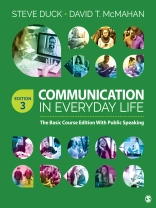Communication in Everyday Life: The Basic Course Edition With Public Speaking offers an engaging look at the inseparable connection between relationships and communication. Best-selling authors Steve Duck and David T. Mc Mahan expertly combine theory and application to introduce students to communication fundamentals. The book provides a strong foundation in communication concepts, theory, and research, while helping readers master practical communication skills such as listening and critical thinking, using technology to communicate, understanding nonverbal communication, creative persuasive strategies, and managing group conflict. The
Third Edition includes enhancements to its proven pedagogical features that reflect updates in research, cultural and societal changes, and emerging issues.
Jadual kandungan
I. COMMUNICATION FOUNDATIONS
1. An Overview of Communication
Learning Outcomes
Everyday Communication and the Relational Perspective
What Is Communication?
Communication Is Symbolic
Communication Requires Meaning
Communication Is Cultural
Communication Is Relational
Communication Involves Frames
Communication Is Both Presentational and Representational
Communication Is a Transaction
Learning Outcomes Revisited
Key Concepts
Communication and You
Technology Connections
II. COMMUNICATION SKILLS
2. Identities, Perceptions, and Communication
Learning Outcomes
Basic Assumptions of Identity Creation
Identities and Perceptions
Transacting Identities: Communication and Performance
Transacting Identities: Self-Disclosure
Transacting Identities: Other People
Learning Outcomes Revisited
Key Concepts
Communication and You
Technology Connections
3. Verbal Communication
Learning Outcomes
How Is Verbal Communication Symbolic?
Kenneth Burke’s Pentad
Functions of Verbal Communication
Learning Outcomes Revisited
Key Concepts
Communication and You
Technology Connections
4. Nonverbal Communication
Learning Outcomes
Misconceptions About Nonverbal Communication
What Is Nonverbal Communication?
The Functions of Nonverbal Communication
Types of Nonverbal Communication
Learning Outcomes Revisited
Key Concepts
Communication and You
Technology Connections
5. Culture and Communication
Learning Outcomes
How Can Culture Be Identified and Studied?
Structure-Based Cultural Characteristics
Transacting Culture
Learning Outcomes Revisited
Key Concepts
Communication and You
Technology Connections
6. Listening
Learning Outcomes
Why Is Listening Important?
Active Listening
Engaged and Relational Listening
Critical Listening
Recognizing and Overcoming Listening Obstacles
Listening Skills
Learning Outcomes Revisited
Key Concepts
Communication and You
Technology Connections
III. COMMUNICATION CONTEXTS
7. Personal Relationships
Learning Outcomes
What Are Personal Relationships?
Benefits of Personal Relationships
Initiating Relationships: Attraction and the Relationship Filtering Model
Developing and Maintaining Relationships
Coming Apart
Learning Outcomes Revisited
Key Concepts
Communication and You
Technology Connections
8. Groups and Leaders
Learning Outcomes
What Is a Group?
Characteristics of Groups
Group Development and Decision Making
Group Decision Making Is About Relationships
Leadership
Learning Outcomes Revisited
Key Concepts
Communication and You
Technology Connections
9. Communication and the Workplace
Learning Outcomes
Learning About the Workplace
Going to Work: The Workplace as a Special Frame
The Workplace as a Culture
The Workplace as Relationships
Learning Outcomes Revisited
Key Concepts
Communication and You
Technology Connections
10. Technology and Media in Everyday Life
Learning Outcomes
Perceptions of Technology and Media
The Relational Uses of Technology and Media
Cell Phones and Relationships
Maintaining Relationships and the Internet
Learning Outcomes Revisited
Key Concepts
Communication and You
Technology Connections
11. Interviewing
Learning Outcomes
Preparing for an Interview
Interviews
Pre-Interview Responsibilities
Beginning an Employment Interview
Asking the Questions During an Employment Interview
Answering the Questions During an Employment Interview
Concluding an Employment Interview
Post-Interview Responsibilities
Learning Outcomes Revisited
Key Concepts
Communication and You
Technology Connections
IV. PRESENTATION SKILLS IN CONTEXT
12. Preparing for a Presentation
Learning Outcomes
Presenting and Relationships
Getting Ready to Present
How Do You Analyze Audiences?
Selecting Your Topic
Determining the Purpose and Thesis of Your Presentation
Evidence and Support Material
Selecting and using Evidence and Support Material
Selecting and Searching for Sources (Inventio)
Learning Outcomes Revisited
Key Concepts
Communication and You
Technology Connections
13. Developing a Presentation
Learning Outcomes
The Body: How Do You Develop an Argument?
Introductions and Conclusions
Learning Outcomes Revisited
Key Concepts
Communication and You
Technology Connections
14. Informative and Persuasive Presentations
Learning Outcomes
Informative Presentations
Persuasive Presentations
Learning Outcomes Revisited
Key Concepts
Communication and You
Technology Connections
15. Delivering a Presentation
Learning Outcomes
Managing Emotions About Speaking
Guidelines for Effective Delivery
Styles of Delivery
Goals of Effective Delivery
Components of Effective Delivery
Presentation Aids
Managing Communication Apprehension
Learning Outcomes Revisited
Key Concepts
Communication and You
Technology Connections
Appendix A: The Discipline of Communication
Learning Outcomes
The Development of a Discipline
The Emergence of Areas of Study
Coming Together as Communication Studies
Future of Communication and the Relational Perspective
Methods of Studying Communication
Social Scientific Approach
Interpretivist Approach
Critical Approach
Areas in the Discipline of Communication
Final Thoughts and Your Future
Learning Outcomes Revisited
Key Concepts
Communication and You
Technology Connections
Appendix B: Sample Presentations
Glossary
References
Index
Mengenai Pengarang
David T. Mc Mahan received his Ph.D. from the University of Iowa in 2001. With research focusing on the social aspects of media and technology, personal relationships, and rhetorical criticism, he is the author of multiple books, and his research and scholarship have been published in numerous academic journals and edited volumes. He was named a Centennial Scholar by the Eastern Communication Association. David has taught courses that span the discipline of communication, including numerous courses in interpersonal communication and personal relationships, media and technology, communication education, theory, and criticism. He has been honored to receive multiple awards for his work in the classroom. A tremendously active member of the discipline, David’s his extensive record of service includes President of the Central States Communication Association, Editor of the Iowa Journal of Communication, and Consulting Editor of the Journal of Communication Pedagogy, along with membership and activity on a vast number of academic committees, executive boards, and editorial boards. He will serve as President of the National Communication Association in 2021. David hopes to one day have the winning entry in the Super Bull competition at the Iowa State Fair.












